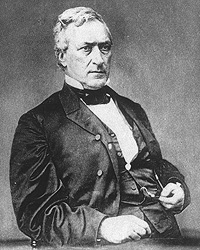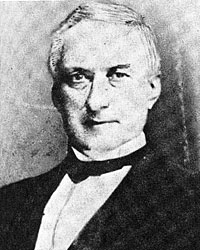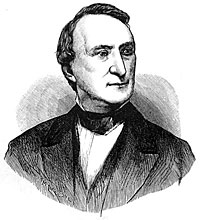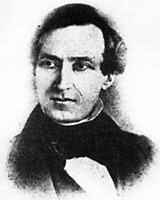John Todd Stuart was known as “Jerry Sly.” A favorite cousin of Mary Todd Lincoln and as a member of Congress after his election in 1862 over Republican Leonard Swett, he was a frequent visitor at the White House even though he was an anti-emancipation Democrat.
In the 1862 congressional race, Stuart tried to capitalize on the unpopularity of the President’s policies while pledging loyalty to the region’s favorite son. According to historian Harry E. Pratt, “Again and again Stuart declared his undiminished respect for Lincoln and ‘unbounding confidence…in his personal integrity.’ He implored the President to ‘follow the dictates’ of his ‘clear head and patriotic heart and preserve the Union by the use of the ample powers conferred upon him by the constitution, and repulse any resort to revolutionary means; and for a Union and a Constitution so preserved, history would erect monuments for him by the side of Washington.’”1
Stuart arrived in Washington for the December 1863 session of Congress and wrote his wife about attempts to see Mrs. Lincoln and his attendance at a reception for visiting Russian naval officers on December 19, 1863:
The next day (Saturday) cousin John & Sue called at Eleven and sent in their cards for Mrs. Lincoln. The messenger brought back that Mrs. Lincoln was dressing—that a card had been sent to Mrs. Craig to the reception that evening at from One to Two. I had also a card—and at One O’clock I called at Willards for Cousin Sue and Charley and we went to the White House. We went into the Blue Room bowed to Mr. Lincoln who held out his hand & said How are you Stuart! I introduced Cousin Sue & Charley and passed over to Cousin Mary. Her salutations were how are you Mrs. Craig!! How do you do Cousin John!!! and after a few common place words of ceremony & form we passed into the East Room. It was very select reception confined to Members of Congress, the Cabinet, Foreign legations and a few distinguished strangers. The dressing of the ladies was very elegant. The reception was give mainly to the Russian Navy who were present in full dress with their ladies who were magnificently dressed. Sue was in ecstacies and would exclaim that is real Tibet!! That is the genuine Cashmere! What magnificent cloth of Gold! We walked around and saw and heard all that was to be seen and heard. It was a scene for many reasons well worth being seen and remembered. After we had been some time in the East Room we received a message from Cousin Mary that she wished us to remain awhile after the reception was over. We did so and after the reception was over Charley [Craig], Cousins Sue [Craig} and myself were invited in Mary’s private Room. After a very pleasant chat of several minutes I made my bow. Cousin John and Charley staid awhile longer who left Sue & Cousin Mary alone. Sue remained about one hour & left with an invitation to accompany Mary to Church to day, she promising to send her carriage to Willards for Sue & Charley and I believe also an invitation for them to dine at the White House to day.”2
Stuart came to the White House when Emilie Todd Helm was visiting. She recalled: “in his manner of greeting me he could not have been more deferential and courtly if he had been bending over the royal hand of Queen Victoria. In his avoidance of any reference to my bereavement he shows his gentle kindness.”3
He was defeated in 1864 by Republican Shelby Moore Cullom, a Lincoln ally. Shortly before Mr. Lincoln died, he told Stuart: “Mary does not expect ever to go back there and don’t want to go, but I did. I expect to go back and make my home in Springfield for the rest of my life.”4 Stuart later chaired the effort to erect a monument over Lincoln’s grave in Springfield. Cullom visited Mr. Lincoln in late 1864 and stumbled awkwardly into a meeting of the Cabinet: “I colored to the roots of my hair, begged pardon for the intrusion and started to go out. President Lincoln arose from his chair at the head of the table and called me by name. He came over to me, got hold of my hand and pulled me into the group of cabinet members. As he did so he said to the secretary of state, ‘Seward, I want you to know this boy. You remember the old congressman from Springfield named Stewart [sic]? I want to introduce to you the boy who beat him. This is the boy.’ He thereupon presented me to the different secretaries. I shook hands with them and backed my way out just as soon as I could.”5
When Robert Todd Lincoln arrived in Springfield for his father’s interment in April 1865, he stayed with John Todd Stuart.
Stuart was a law partner of Abraham Lincoln’s from 1837 until 1841. Stuart met Lincoln in the Black Hawk War in which Stuart was a major—before he met any of the other members of the Todd clan. He was a fellow legislator and Whig leader when Lincoln first was elected to the Illinois Assembly; he encouraged Lincoln’s study of the law. He was outgoing and friendly but a political manipulator behind the scenes. Lincoln contemporary John Bunn maintained: “The partnership between John T. Stuart and Mr. Lincoln was dissolved because of political differences and differences of opinion on the slavery question. Mr. Stuart was from Kentucky and was an old time Whig, but afterwards joined the Democratic party. He was pro-slavery in his leanings.”6
Stuart was described by a Springfield contemporary as “a type of a gentleman of the old times, so gentle and courteous – with as fine and gallant a bow for his laundress as for a Duchess. “I remember his saying to me one day, ‘Carrie, I believe I am going to live to posterity only as the man who advised Mr. Lincoln to study law and lent him his law books. It is a little humiliating that a man who has served his country in Congress and in his State, should have no further claim to remembrance than that, but I believe it will be so.’”7 Historian James A. Rawley wrote: “Rough-hewn, in debt, and lonely when he commended the practice of law, Lincoln, partly through Stuart, early became associated with the local aristocracy.”8 He also may have introduced Mr. Lincoln to another side of society. Lincoln scholar H. Donald Winkler wrote: “Stuart, a worldly man with a reputation for pursuing and seducing women, apparently coaxed Lincoln to accompany him to a house of prostitution in Galena, Illinois. ‘We went purely for fun and devilment, nothing else,’ said Stuart, without elaborating on what those words meant.’”9
Stuart had run unsuccessfully for Congress in 1836, but defeated Stephen Douglas in 1838 and served until 1842. He practiced law with Benjamin Edwards, who was a brother of Ninian Edwards, Lincoln’s brother-in-law. Later, Stuart and Lincoln diverged politically. Stuart backed Millard Fillmore for President in 1856 and Stephen Douglas in 1858. He was the unsuccessful Constitutional Union candidate for Governor of Illinois in 1860.
Footnotes
- Harry E. Pratt, “The Repudiation of Lincoln’s War Policy in 1862 – Stuart-Swett Congressional Campaign,” Journal of the Illinois State Historical Society, April 1931, p. 11.
- Harry E. Pratt, editor, Concerning Mr. Pratt, p. 104-5.
- Katherine Helm, Mary, Wife of Lincoln, p. 228.
- Don E. and Virginia Fehrenbacher, Recollected Words of Abraham Lincoln, p. 431.
- Shelby M. Cullom, Michael Burlingame, editor, Walter B. Stevens, A Reporter’s Lincoln, p. 153.
- Caroline Owsley Brown, “Springfield Society Before the Civil War,” Journal of the Illinois State Historical Society, April-July 1922, p. 490.
- James A. Rawley, Abraham Lincoln and a Nation Worth Fighting For, p. 10.
- H. Donald Winkler, The Women in Lincoln’s Life, p. 62.
- Jesse W. Weik, The Real Lincoln: A Portrait, p. 337.
Visit
Mary Todd Lincoln
Elizabeth Todd Edwards
William H. Seward
Leonard Swett
John Todd Stuart (Mr. Lincoln and Friends)
Abraham Lincoln and Springfield











